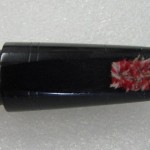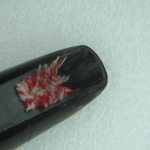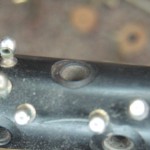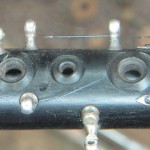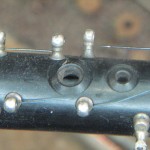Post 7: Crack Prevention
Wood oboes slowly expand and contract constantly throughout the year. For most of the year, the changes our oboes go through are so small we hardly ever notice. When there is a sudden change in weather; i.e. temperature, the oboe can’t keep up with its normal slow changes which results in major regulation issues and even cracking. It is up to us to give our oboe the utmost care during these most critical times of the year. Below are a few points which can be followed to help prevent your oboe from cracking.
• When the weather turns cold do not play your oboe if it feels cool to the touch. Your oboe needs to warm up from the outside to the inside. This means, do not blow through your oboe to warm it up, but hold it in your hands or put it under your arm pit. When the oboe feels like it is back up to room temperature then it is safe to start playing it.
• It is critical that the upper joint be warmed up all the way through the wood. Doing this will warm up the metal octave pips and drastically reduce the chance of moisture forming in the octave keys. There is no true way to avoid getting moisture stuck in your tone holes, but this step will help.
• After your oboe is up to room temperature, I suggest warming up by playing 5-note groups in the lower register of your oboe not going above a 2nd line G for the first couple minutes. This will allow the instrument to completely finish warming up before the left hand tone holes are opened, which will hopefully help reduce the chance of condensation forming in those tone holes.
• Moisture- Your wooden oboe was once a tree which had natural moisture such as tree sap and water. Once the tree is cut down and machined into a musical instrument we have to maintain a certain amount of moisture in order for the wood to not dry out and crack. There are many different thoughts on how moisture should be “applied.” I believe you should oil your oboe. You should oil your oboe 2-3 times a year, or have your professional repair technician do this for you. If you are buying a brand new oboe, oiling once a week for a couple months would be wise. You never know how long a new oboe has been setting around and in what conditions it has been setting.
• Humidifiers- I always keep a humidifier in my oboe case. Your oboe spends most of its time in the case, so I like to have the environment inside the case to be as stable as possible. Now, I have no proof that the humidifier actually does anything, but it definitely doesn’t hurt. And as cheap as humidifiers are, why wouldn’t you do this step if there is a possibility it will help prevent cracking!
• After you have finished playing your oboe and are putting it away in its case, you have to remove all excess water, spit, and condensation from the oboe. This step is essential to help prevent cracks form in your oboe. First, feather or swab out your oboe to remove any visible condensation from the bore of the oboe. Second, on the upper joint, use cigarette paper to check for moisture in the closed keys. Do not leave any spit in the tone holes of the closed keys, doing so will result in the wood expanding too quickly which leads to cracking. If the cigarette paper is wet continue this process until all moisture is gone. Third, prop open your trill keys before closing up your case. This will insure that any lingering condensation in the trill tone holes will fall out or evaporate. To prop the trills open, I use the cardboard protective wrapping from a razor blade. It is a perfect thickness to slip down in between the trill levers and the trill keys. Just remember to pull the material out of the trills before you re-assemble the oboe.
• Please don’t hesitate to contact me if you have any questions or concerns regarding these issues. You can also download my Crack Prevention article by clicking here.
Jason Onks
615-223-9015

